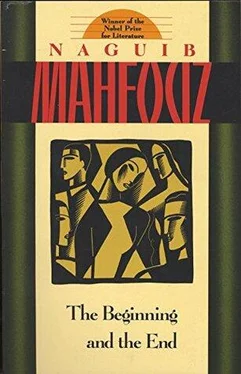Naguib Mahfouz - The Beginning and the End
Здесь есть возможность читать онлайн «Naguib Mahfouz - The Beginning and the End» весь текст электронной книги совершенно бесплатно (целиком полную версию без сокращений). В некоторых случаях можно слушать аудио, скачать через торрент в формате fb2 и присутствует краткое содержание. Год выпуска: 2016, Издательство: Anchor Books, Жанр: Классическая проза, на английском языке. Описание произведения, (предисловие) а так же отзывы посетителей доступны на портале библиотеки ЛибКат.
- Название:The Beginning and the End
- Автор:
- Издательство:Anchor Books
- Жанр:
- Год:2016
- ISBN:нет данных
- Рейтинг книги:4 / 5. Голосов: 1
-
Избранное:Добавить в избранное
- Отзывы:
-
Ваша оценка:
- 80
- 1
- 2
- 3
- 4
- 5
The Beginning and the End: краткое содержание, описание и аннотация
Предлагаем к чтению аннотацию, описание, краткое содержание или предисловие (зависит от того, что написал сам автор книги «The Beginning and the End»). Если вы не нашли необходимую информацию о книге — напишите в комментариях, мы постараемся отыскать её.
The Beginning and the End — читать онлайн бесплатно полную книгу (весь текст) целиком
Ниже представлен текст книги, разбитый по страницам. Система сохранения места последней прочитанной страницы, позволяет с удобством читать онлайн бесплатно книгу «The Beginning and the End», без необходимости каждый раз заново искать на чём Вы остановились. Поставьте закладку, и сможете в любой момент перейти на страницу, на которой закончили чтение.
Интервал:
Закладка:
“What made you think she’s not the ideal wife for you?” Nefisa asked.
“Bahia just isn’t fit to be my wife,” Hassanein said with annoyance. “Sure, I chose her myself. But at that time I didn’t know she wasn’t for me.”
“Bahia is a polite, beautiful girl,” the worried mother replied. “Besides, we can never forget her father’s help to us.”
“Your judgment surprises me,” Hussein said disapprovingly. “What is your idea of a good wife?”
“I want a wife from a higher class, cultured and reasonably wealthy,” Hassanein said after a pause.
“So these are your reasons for breaking your promises?” Hussein inquired in the same tone.
“We’re poor and Bahia is almost as poor as we are,” Hassanein sighed. “If I should die as my father did, before my time, I’m afraid I’d leave my sons, as my father left us, to the same cruel poverty.”
“You’re right,” Nefisa said with enthusiasm.
Hussein was angered by his sister’s enthusiasm. “Have you considered the serious consequences of the step you’re taking?” he demanded.
“I’m extremely sorry about this,” Hassanein replied. “But I don’t approve of wasting my life.”
“All the same, you approve of wasting hers?”
“Her life won’t be wasted. She’s still in the prime of her youth, and she’s got a brilliant future ahead of her.”
“Would you allow me,” Hussein said angrily, “to describe your behavior for what it really is?”
Hassanein looked at him sullenly.
Hussein shook his head, disturbed. “I wonder,” he said, “how you can condemn Hassan’s behavior when there’s no justification for yours?”
The young man turned pale. “No doubt,” he answered sharply, “my behavior is not without its cruelty. But it will all end well for both parties. Anyhow, this is far better than an unsuccessful marriage.”
Hussein turned his face away in desperation.
Striking the palm of one hand against the other, their mother murmured, “What a terrible offense to this most good-hearted family! Oh, God! How can I hide my shame?”
Her words were sincere, but actually she felt a deep inner relief. She was afraid that Hassanein’s precipitous marriage would reduce the family to its former state of worry and insecurity. Wondering about Nefisa’s future, she invariably became fearful and sad. But despite her sense of inner relief, she thought of Farid Effendi’s family with pain and shame.
Unable to conceal her real feelings, Nefisa said, “Don’t worry about Bahia. She’ll soon find a husband.”
“The same generally applies to every girl,” Hussein said. “But it’s no defense for our mistakes.”
“It doesn’t apply to every girl,” Nefisa said, “and the proof is that it doesn’t apply to me, your sister.”
Her irony relieved the pervading tension. Hassanein seized the opportunity to exclaim enthusiastically, “Isn’t it better to choose a special kind of wife, such as Ahmad Bey Yousri’s daughter, for example?”
“God has the power to grant the wishes of His creatures,” Nefisa said gaily. “Who knows? Perhaps one day you’ll be living in a respectable villa and we’ll continue to have your help and kindness.”
Hussein paid no attention to the remarks of his brother and sister. Their mother said, as if to herself, “This evening Farid Effendi will know everything. What will he say about us? I wish I could muster up enough courage to visit them and apologize to them!”
Pondering at length, Hussein murmured calmly but firmly, “I’ve got that kind of courage.”
All were interested.
“Would you really go?” Nefisa asked him. “And what would you say to them?”
“God will inspire me on the spur of the moment with something suitable to say,” the young man answered with a frown. “Oh, God! Surely there’s some impurity in our blood.”
He put on his clothes and left the flat.
EIGHTY
Hussein did not go directly to his destination, but went first to a coffeehouse in Heliopolis, where he sat for an hour thinking the matter over. His thoughts wandered from the memories of the past to the events of the present. For a long time, he probed his mind and heart, then came to a decision. Putting aside all doubts and fears that caused him to waver, he became unusually bold, firm, and decisive, so much so that he marveled at his speed in reaching the decision. Did he arrive at this decision on the spur of the moment or did it result from an accumulation of his own deep sentiments over a period of three years? Somewhat confused, he reviewed all the various perspectives. Now, nothing could deter him from his determined course. He rose and left his place with mixed feelings, vacillating from an expansive kind of pleasure to a gripping worry to a bountiful spirit of adventure. Proceeding to the alley, he easily reached it by the evening. Now, as he approached their old house, he realized how difficult and embarrassing his mission was. Yet he advanced with steady steps and an unflinching determination. With a beating heart, he knocked on the door. The astonished glance of the servant who opened it for him irritated him. She showed him to the sitting room. Farid Effendi entered, his body sagging, his face sad for the first time, his eyes burning with anger. No sooner did the host finish with the customary complimentary salutations on receiving a guest than he exclaimed in a paroxysm of passion, “Our lifelong friendship, our lifelong neighborliness, and our lifelong companionship! In one moment you’ve torn all these to shreds!”
Confounded, Hussein looked at the table in front of him. “Our old mutual feelings of affection can never change,” he murmured in a low voice. “Nor can we forget as long as we live your splendid character and your assistance to us.”
Paying no attention, Farid Effendi continued, striking one palm against the other. “When they told me about it, I couldn’t believe my ears. My heart refuses to believe that such disgraceful treachery is possible.”
“Sir, what you say is justified. But believe me, we found it just as hard to believe as you. My mother is deeply upset.”
Still paying no heed, Farid Effendi went on. “I noticed that he didn’t visit us as frequently as before. And to explain this change of attitude, they put forward childish excuses, which made me more pessimistic. This evening I learned that he had openly breached his promise. How amazing! Does he imagine that girls of good families are mere toys in his hands, to be disposed of any way he likes? So he gets engaged as he pleases and breaks engagements as he pleases! I have always treated him like a son, and it never occurred to me that he could be so wicked and so treacherous!”
Acutely embarrassed, Hussein began to advance whatever came to his mind in defense of his brother: “My brother is a rash young man, and this business of Hassan made him go out of his mind.”
“But are we at fault?” the man asked. “This is an incomprehensible excuse!”
“What I mean is, the disaster so shook his nerves and impaired his judgment that he was sick of the whole world.”
Violently waving his hand, the man said indignantly, “What you say is unconvincing. I’m a man of some experience, and I know that a man does not desert his fiancée for such a reason. Tell me a different story if you want me to believe you. Say now that he’s an officer he wants to marry a different sort of girl.”
“With all my heart I wish I could repair the damage,” Hussein said sadly.
“The damage is beyond repair. What has happened doesn’t become honorable people. Had I been a different man I would have chastised him. But thank God that, after his deceiving me for so long, I’ve discovered what kind of person he is. He’s only a mean and cowardly young man. Excuse me for blurting out the truth so bluntly.”
Читать дальшеИнтервал:
Закладка:
Похожие книги на «The Beginning and the End»
Представляем Вашему вниманию похожие книги на «The Beginning and the End» списком для выбора. Мы отобрали схожую по названию и смыслу литературу в надежде предоставить читателям больше вариантов отыскать новые, интересные, ещё непрочитанные произведения.
Обсуждение, отзывы о книге «The Beginning and the End» и просто собственные мнения читателей. Оставьте ваши комментарии, напишите, что Вы думаете о произведении, его смысле или главных героях. Укажите что конкретно понравилось, а что нет, и почему Вы так считаете.












